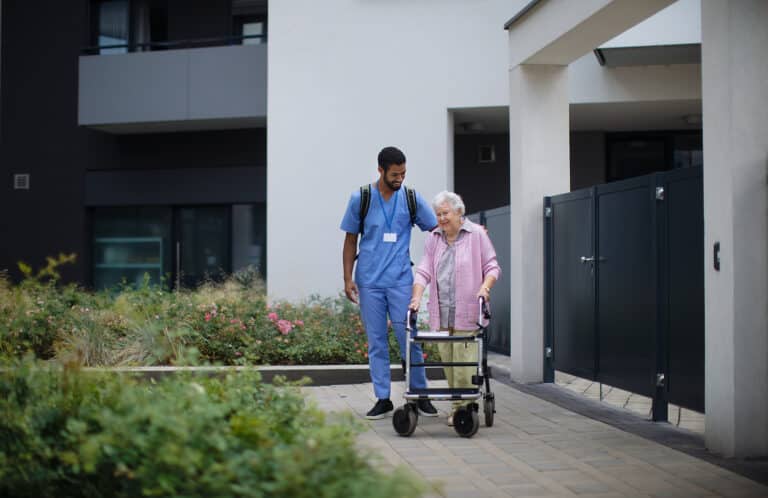Knee replacement surgery is an incredibly common procedure, but that doesn’t mean it isn’t a bit scary. Medical professionals typically recommend knee replacement surgery to alleviate pain and to restore mobility when someone has experienced a knee injury or has arthritis in the knee. Recovering from surgery is a process, and hospital to home transition care can make that process easier.
What Is Knee Replacement Surgery?
During knee replacement surgery, the surgeon replaces damaged parts of the knee joint with artificial joint pieces. These are usually made from metal or plastic and they mimic the functions of the original knee parts. Some people only need to have some parts of the knee replaced, while others need to have the entire knee replaced. The procedure helps to restore function while relieving pain and improving mobility for people with knee issues.
Walking After Knee Replacement Surgery
Being able to walk without pain is often the biggest reason that someone chooses to go through with knee replacement surgery. After surgery, patients may experience stiffness and discomfort, but in the hospital they’ll be encouraged to walk with assistance soon after surgery. Patients may also work with a physical therapist in the hospital to learn to use assistive devices, develop a plan for walking, and solve any problems they’re experiencing right after surgery.
Returning Home After Surgery
When it’s time to come home, patients may worry that they’re just not ready yet. Having hospital to home transition care gives people who have had a knee replacement a support to lean on as they return home. Care providers help patients understand what they need in terms of accommodations and safety, ensuring that they have what they need to be as safe as possible. Hospital to home transition care can also help patients understand their post-operative instructions and answer questions when they arise.
Lifestyle Changes After Knee Replacement
Some people find they need to make some lifestyle changes after a knee replacement. It’s vital to prioritize activities that support joint health and overall well-being. That might involve switching to low-impact exercise plans, maintaining a healthy weight, and using proper body mechanics during regular daily activities. Many people find that after knee replacement surgery, it’s easier to make some of these changes, like walking every day. They’re often in a lot less pain and are in a better position to be more physically active.
Coordinating Care and Therapies
Specialists like physical therapists or occupational therapists might be involved in making some of these lifestyle changes, and hospital to home transition care can help patients access that help if they need it. Physical therapy helps most with strengthening muscles and improving range of motion, while occupational therapy is helpful with navigating activities of daily living. Healing properly means getting the right assistance when it’s needed.
Recovering from knee replacement surgery requires patience and the right support from everyone involved. Hospital to home transition care can make the process a lot easier to understand. They can also help to make it much easier to get necessary help before the situation becomes too difficult to manage.
If you or an aging loved one are considering Hospital to Home Transition Care in Columbia, SC please contact the caring staff at Avodah Home Care. Call (877) 4-AVODAH
Avodah Home Care is a Trusted Home Care Agency serving Abbeville, Aiken, Anderson, Barnwell, Calhoun County, Chesterfield County, Darlington, Dillon, Edgefield, Batesburg-Leesville, Florence, Greenville, Greenwood, Columbia, Lexington, Camden, Blythewood, Winnsboro, Orangeburg, Sumter, Gaston, Hopkins, Bishopville and surrounding areas.
Our team includes registered nurses, licensed practical nurses, certified nursing assistants, home health aides, and other healthcare professionals, all of whom have years of experience in the home care industry. We work together to provide comprehensive care that encompasses both medical and non-medical services, helping our clients maintain their independence and live with dignity in their own homes.
With our decades of experience, we have developed a deep understanding of the home care industry and the best practices for providing high-quality care. We are dedicated to staying up-to-date on the latest advances in care delivery, and we are committed to providing our clients with the most effective, evidence-based care.
At our core, our team is driven by a deep commitment to our clients and their families. We know that home care can be a difficult and challenging journey, and we are here to provide the support, guidance, and care that our clients need to thrive. Our team members are not only experienced professionals, but also compassionate and caring individuals who are dedicated to making a difference in the lives of our clients.
- 5 Activities That Will Keep Seniors From Getting Bored At Home - October 22, 2024
- Seven Benefits of Skilled Nursing Care for Chronic Illness Management - October 4, 2024
- The Emotional Benefits of 24-Hour Home Care For Seniors - September 20, 2024




